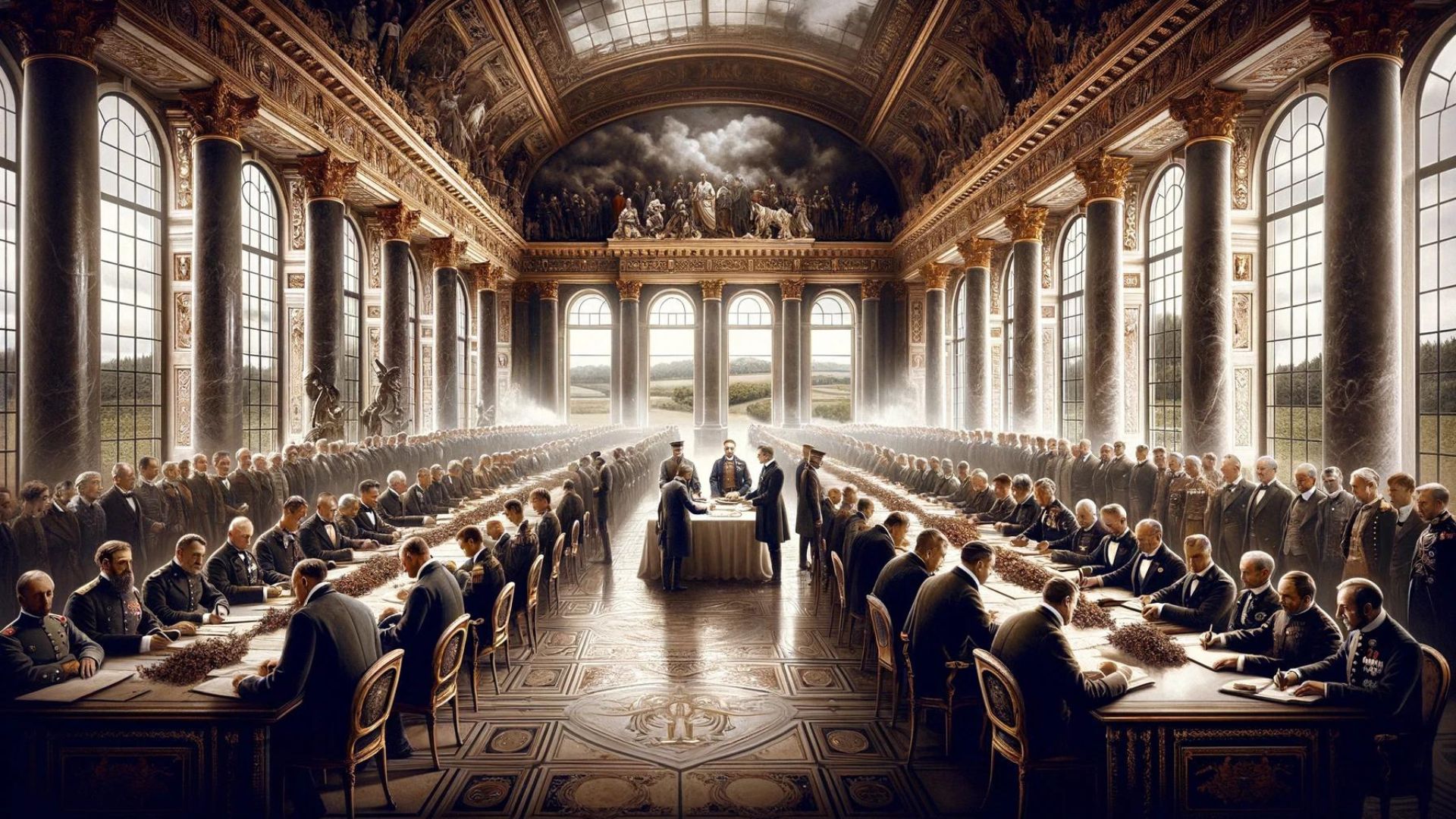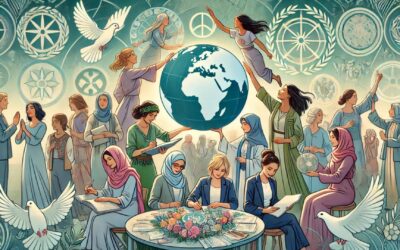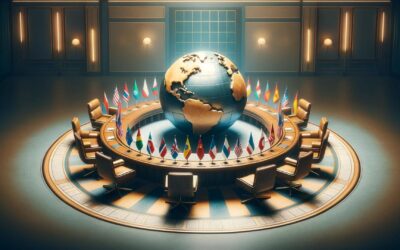Against All Odds: The Treaty of Versailles
After four years of brutal trench warfare, the world craved peace in 1918. The bloodshed of World War I had shaken empires and redrawn maps. The Treaty of Versailles, signed in 1919, was meant to be the blueprint for a new order, preventing such a catastrophe from ever recurring.
Yet, just two decades later, the world plunged into the even deadlier World War II, proving the Treaty of Versailles a colossal failure. Why did this ‘peace’ treaty sow the seeds of future conflict? Let’s break it down:
- Victors’ Justice: Germany, defeated and excluded from the negotiations, was handed crippling conditions:
- Blame Game: Germany forced to accept sole responsibility for the war.
- Reparations: Massive payments that devastated the German economy.
- Military Limits: Army reduced, key industries curtailed, aiming to prevent Germany from ever waging war again.
- Land Loss: Territory carved away, causing resentment and instability across Europe.
- Humiliation & Resentment: These terms weren’t just about limitations; they were about humiliation. In Germany, a deep-seated resentment festered, alongside economic hardship. This sense of injustice became fertile ground for extremists like Hitler to rise to power.
- The Forgotten Fronts: While the victors focused on punishing Germany, other regions were destabilized. The collapse of the Ottoman Empire and the arbitrary redrawing of Middle Eastern borders planted the seeds of conflicts we still grapple with today.
- Missed Opportunity?: Some hoped for a less punitive peace, one focused on reconciliation and establishing a true League of Nations to prevent future war. These voices, tragically, were overruled.
Lessons Carved in Blood
The Treaty of Versailles teaches us several vital but painful truths:
- Humiliation is Dangerous: Punishing a defeated nation excessively can create a desire for revenge, not a foundation for lasting peace.
- Collective Security Matters: True peace requires cooperation and a system to address conflicts BEFORE they erupt into war.
- Wounds Take Time: Societies ravaged by war need support, healing, and a stake in rebuilding, or resentment and extremism can take root.
It’s Not Just History
The legacy of the Treaty of Versailles lives on in the way we think about post-conflict peacebuilding:
- Listen to all sides: Do modern peace treaties involve those most impacted by the conflict, or do they risk leaving a legacy of resentment?
- Economic opportunity: When war-torn areas lack economic recovery, is it any surprise when old conflicts reignite?
- Shared Responsibility: Can we create international systems that prioritize conflict prevention over assigning blame, fostering peace that’s fair for everyone involved?
The Treaty of Versailles is a cautionary tale. Let’s learn from its failures and strive for a kind of peace that:
- Seeks true reconciliation: Acknowledge past wrongs, find paths to rebuild trust, even between former enemies.
- Pursues inclusive solutions: Support nations devastated by war in getting back on their feet, creating a future where conflict feels less appealing.
True peace is an ongoing effort. By understanding where past attempts may have gone wrong, we gain a clearer path toward a future where treaties are true bridges to peace, not steps towards another inevitable war.
Why Should You Care?
- History isn’t dead, it’s alive: The Treaty of Versailles had a direct impact on events leading to WWII, and its legacy influences how we approach peacemaking to this day.
- Avoiding the mistakes of the past: Understanding why this treaty failed is vital to preventing similar blunders in modern conflicts and their aftermath.
- The quest for lasting peace: The Treaty’s flaws highlight the complexity of building true peace, the need for empathy, and finding ways to prevent future wars.
Key Takeaways
- Humiliation fuels conflict: Punitive peace treaties that shame a defeated nation can breed resentment and set the stage for future wars.
- Missed opportunities for reconciliation: The Treaty focused on punishing Germany rather than fostering reconciliation and rebuilding a stable Europe.
- Redrawing borders has consequences: The arbitrary restructuring of nations, especially in the Middle East, created instability that persists today.
- Global cooperation is key: The Treaty of Versailles highlights the need for international systems that focus on preventing conflict, not just assigning blame after the fact.
- Peace is an ongoing process: True and lasting peace requires economic support, healing for war-torn societies, and inclusivity in peace agreements.
Keywords
- Treaty of Versailles: The peace treaty signed in 1919, ending WWI, which placed harsh conditions on defeated Germany.
- World War I (WWI): Global conflict from 1914-18, marked by trench warfare, new technologies, and immense casualties.
- Reparations: Financial compensation demanded from Germany to the Allies, intended to cover war damage, but which crippled the German economy.
- Territorial losses: Germany lost significant territories under the Treaty, including Alsace-Lorraine to France, which fueled resentment.
- League of Nations: International organization formed after WWI to promote peace and cooperation, but ultimately weakened by the US’s non-participation and inability to prevent aggression.
- Ottoman Empire: Vast empire that dissolved after WWI, with the Treaty of Versailles impacting the redrawing of borders in the Middle East.
- Weimar Republic: Democratic government of Germany established after WWI, which struggled with the Treaty’s harsh conditions and political extremism.
- Adolf Hitler: Exploited German resentment over Versailles to gain power, his leadership ultimately plunging the world into WWII.
- World War II (WWII): An even deadlier global conflict from 1939-45, partly fueled by resentment over the Treaty of Versailles.
- Peacebuilding: The process of creating conditions for lasting peace after a conflict, focusing on reconciliation, economic recovery, and addressing the root causes.
Frequently Asked Questions
- Could WWI have been prevented entirely? Complex question, but historians highlight growing nationalism, arms races, and tangled alliances as contributing factors making some conflict likely.
- Were any countries truly satisfied with the Treaty? Not really. Even some Allied nations thought it was too harsh, while Italy and Japan felt slighted despite being victors.
- Why didn’t the US ratify the Treaty? Isolationist sentiment, disagreements over League of Nations membership, and domestic politics all played a role.
Myth Buster
- Myth: The Treaty of Versailles was solely to blame for WWII. Reality: It was a major factor, but also the failure of appeasement policies later on, global economic instability, and the rise of fascist leaders.
Let’s Talk
- Is true reconciliation ever possible between former enemies? What examples are there of its success or failure?
- How does the Treaty of Versailles inform how you think modern peace negotiations should be conducted?
- Could a future international system TRULY prevent wars, or are conflicts inevitable?
Let’s keep the conversation flowing! Share your opinions in the comments below.












0 Comments